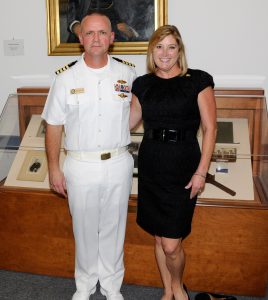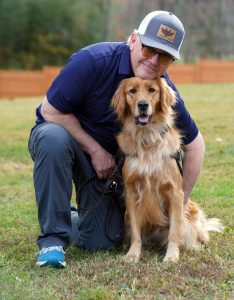I Survived Iraq Twice. Then I was Nearly Killed at a Restaurant Close to Home
By Rod Moore
When I deployed to Iraq in 2007, I was prepared to give my life for my country. The same was true when I deployed again in 2009 as a Navy engineer chief responsible for the multi-billion dollar Iraqi reconstruction effort.
I never could have imagined nearly dying at a restaurant in the United States.
Yet that’s what happened as I dined with my wife on a beautiful summer evening in 2017
In a single moment, all of the trauma from my time in Iraq returned.
I would spend the next five years undergoing numerous surgeries, treatments, and therapy. But it wasn’t until I met my service dog this year that I felt I had any chance of reclaiming the person I’d once been.
Choosing a Navy career
I joined the Navy in 1989. My primary motivation was financial; I needed money to finish college. Over the next dozen years, I went on multiple peacetime tours and deployments. By 9/11, I was career-bound. From July 2007 to March 2008, I provided direct engineering and construction support to the Marines in combat in Iraq.
I took on progressively more responsibilities after that, ultimately making the rank of Navy captain. I deployed to Iraq again from 2010 to 2011. It was, in hindsight, the more difficult of the two combat tours. The U.S. was drawing down its forces; fewer troops meant greater risk. After my return, I began experiencing symptoms common with PTSD—anger, anxiety, hypervigilance, and difficulty re-integrating into society.

Rod Moore, a U.S. Navy captain, and his wife, Amy.
I pushed down worries that asking for help could negatively impact my career and spent two years in therapy. I thought I’d processed my combat trauma. But it turns out I had just compartmentalized it.
A catastrophic injury
As I enjoyed dinner at an open-air restaurant that evening in the summer of 2017, the staff in another establishment directly above attempted to open a large sliding glass door, unbeknownst to those who dined below.
The glass door—weighing about 250 pounds—dislodged, falling through the air like a guillotine and crashing onto my head, neck, and back. As patrons rushed to help, I went in and out of consciousness. One was a soldier in camouflage. Suddenly, I was back in Iraq.
I initially spent three days in the hospital. We would learn later that an artificial disc—broken during the accident—actually saved my life. But the injury ended my Navy career.
Over the next several years, as I underwent surgeries and treatments, I was diagnosed with a traumatic brain injury. I was forced to retire from the Navy. I lost my identity, my sense of self, my sense of purpose. And I struggled to comprehend how I’d gone to combat ready to die to almost dying in a restaurant. It simply didn’t comport.
The things I loved that once came so easily to me — reading, listening to music, traveling — became nearly impossible. For seven years, other than medical appointments, I stayed almost exclusively inside our home. I couldn’t go to a restaurant, a sporting event, or a movie theater. Simple tasks like going to a grocery store or meeting friends outside our home eluded me.
I have been honored to participate in many incredible programs, including those that do remarkable work for veterans with PTSD and TBIs. What they didn’t do was help me re-establish my sense of purpose and identity.
Meeting my service dog
I met my service dog on a bright November morning. Lavsky — named for Army Capt. Michael Tarlavsky who was killed in action in Iraq in 2004 at the age of 30 — practically pranced as she made her way to meet me, seemingly unable to contain her excitement.

Rod and his service dog, Lavsky.
As I bent down to greet her, Lavsky covered me in kisses. Lisa, her primary trainer for the last 18 months, said she’d never seen Lavsky respond to anyone that way. It was as if she knew. As if she’d been waiting for me.
I’d certainly been waiting for her.
Service dogs aren’t magic. I wasn’t instantly cured of years of trauma. Healing, I know, will be a lifelong journey for me. But over the days and weeks that followed, as Lavsky and I got to know each other and learned to work together, I had, for the first time, a 24-hour companion.
My confidence is growing. I can go to a grocery store. I can go to my local coffee shop with my wife and actually enjoy it. Lavsky has given me the confidence to do these things. She is, I like to say, life re-giving.
I am so grateful for that.
Rod Moore is a retired Navy captain who served his country for 29 years. He lives in Colorado with his wife, Amy.
